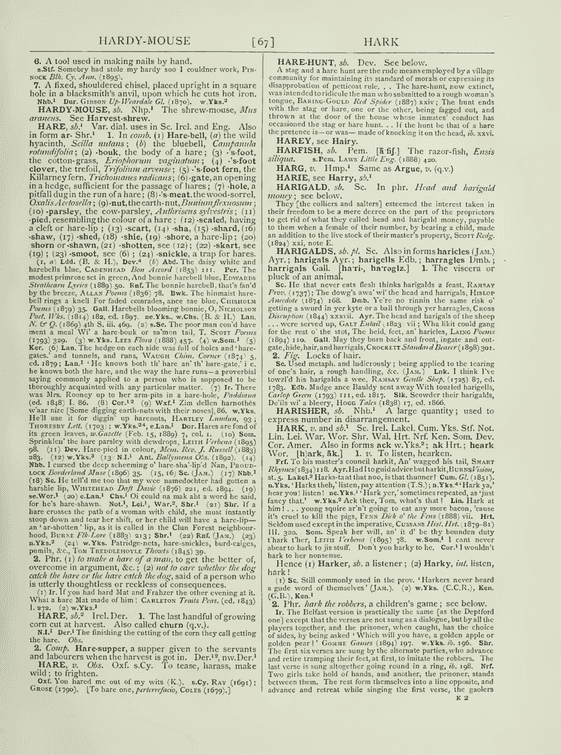Hare
Source : Wright, Joseph English Dialect Dictionary web : https://eddonline4-proj.uibk.ac.at/edd/main.html
HARE, sb.1 Var. dial. uses in Sc. Irel. and Eng. Also in form ar- Shr.1 1. In comb. (1) Hare-bell, (a) the wild hyacinth, Scilla nutans; (b) the bluebell, Campanula rotundifolia; (2) Hare-bouk, the body of a hare; (3) Hare's-foot, the cotton-grass, Eriophorum vaginatum; (4) Hare's-foot clover, the trefoil, Trifolium arvense; (5) Hare's-foot fern, the Killarney fern, Trichomanes radicans; (6) Hare-gate, an opening in a hedge, sufficient for the passage of hares; (7) Hare-hole, a pitfall dug in the run of a hare; (8) Hare's-meat, the wood-sorrel, Oxalis Acetosella; (9) Hare-nut, the earth-nut, Bunium flexuosum; (10) Hare-parsley, the cow-parsley, Anthriscus sylvestris; (11) Hare-pied, resembling the colour of a hare; (12) Hare-scaled, having a cleft or hare-lip; (13) Hare-scart, (14) Hare-sha, (15) Hare-shard, (16) Hare-shaw, (17) Hare-shed, (18) Hare-shie, (19) Hare-shore, a hare-lip; (20) Hare-shorn or Hare-shawn, (21) Hare-shotten, see (12); (22) Hare-skart, see (19); (23) Hare-smoot, see (6); (24) Hare-snickle, a trap for hares. (1, a) Ldd. (B. & H.), Dev.4 (b) Abd. The daisy white and harebells blue, Cadenhead Bon Accord (1853) iii. Per. The modest primrose set in green, And bonnie harebell blue, Edwards Strathearn Lyrics (1889) 50. Rnf. The bonnie harebell, that's fan'd by the breeze, Allan Poems (1836) 78. Bwk. The hinmaist harebell rings a knell For faded comrades, ance sae blue, Chisholm Poems (1879) 35. Gall. Harebells blooming bonnie, O, Nicholson Poet. Wks. (1814) 182, ed. 1897. ne.Yks., w.Chs. (B. & H.) Lan. N. & Q. (1869) 4th S. iii. 469. (2) s.Sc. The poor man cou'd have ment a meal Wi' a hare-bouk or sa'mon tail, T. Scott Poems (1793) 329. (3) w.Yks. Lees Flora (1888) 457. (4) w.Som.1 (5) Ker. (6) Lan. The hedge on each side was full of holes and ‘hare-gates,’ and tunnels, and runs, Waugh Chim. Corner (1874) 5, ed. 1879; Lan.1 ‘He knows both th' hare an' th' hare-gate,’ i.e. he knows both the hare, and the way the hare runs ─ a proverbial saying commonly applied to a person who is supposed to be thoroughly acquainted with any particular matter. (7) Ir. There was Mrs. Rooney up to her arm-pits in a hare-hole, Paddiana (ed. 1848) I. 86. (8) Cor.1 Cor.2 (9) Wxf.1 Zim dellen harnothès w'aar nize [Some digging earth-nuts with their noses], 86. w.Yks. He'll use it for diggin' up harenuts, Hartley Lundun, 93; Thoresby Lett. (1703); w.Yks.2 w.Yks.4, e.Lan.1 Dor. Hares are fond of its green leaves, w. Gazette (Feb. 15, 1889) 7, col. i. (10) Som. Sprinklen' the hare parsley with dewdrops, Leith Verbena (1895) 98. (11) Dev. Hare-pied in colour, Mem. Rev. J. Russell (1883) 283. (12) w.Yks.3 (13) N.I.1 Ant. Ballymena Obs. (1892). (14) Nhb. I cursed the deep scheeming o' hare-sha'-lip'd Nan, Proudlock Borderland Muse (1896) 35. (15, 16) Sc. (Jam.) (17) Nhb.1 (18) Sc. He tell'd me too that my wee namedochter had gotten a harshie lip, Whitehead Daft Davie (1876) 221, ed. 1894. (19) se.Wor.1 (20) e.Lan.1 Chs.1 Oi could na mak aht a word he said, for he's hare-shawn. Not.1, Lei.1, War.2, Shr.1 (21) Shr. If a hare crosses the path of a woman with child, she must instantly stoop down and tear her shift, or her child will have a hare-lip ─ an ‘ar-shotten’ lip, as it is called in the Clun Forest neighbourhood, Burne Flk-Lore (1883) 213; Shr.1 (22) Rnf. (Jam.) (23) n.Yks.2 (24) w.Yks. Patridge-nets, hare-snickles, burd-caiges, pumils, &c., Tom Treddlehoyle Thowts (1845) 39. 2. Phr. (1) to make a hare of a man, to get the better of, overcome in argument, &c.; (2) not to care whether the dog catch the hare or the hare catch the dog, said of a person who is utterly thoughtless or reckless of consequences. (1) Ir. If you had hard Mat and Frahzer the other evening at it. What a hare Mat made of him! Carleton Traits Peas. (ed. 1843)
I. 272. (2) w.Yks.1
HARE, sb.2 Irel. Der. 1. The last handful of growing corn cut at harvest. Also called churn (q.v.). N.I.1 Der.1 The finishing the cutting of the corn they call getting the hare. Obs. 2. Comp. Hare-supper, a supper given to the servants
and labourers when the harvest is got in. Der.1 Der.2, nw.Der.
HARE, v. Obs. Oxf. s.Cy. To tease, harass, make wild; to frighten. Oxf. You hared me out of my wits (K.). s.Cy. Ray (1691);
Grose (1790). [To hare one, perterrefacio, Coles (1679).]
HARE, sb. Yks. Lan. 1. In comp. Hare-scar, a hare lip. n.Yks. (I.W.) 2. Phr. the hare and the hare-gate, everything connected with the matter. s.Lan.1 20.
